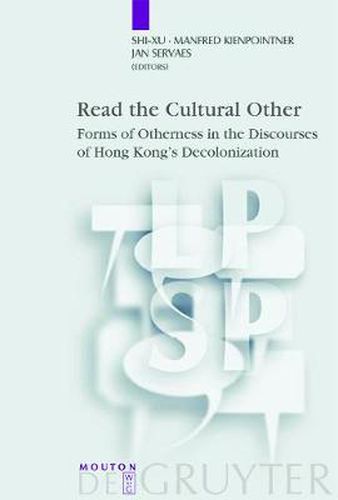Readings Newsletter
Become a Readings Member to make your shopping experience even easier.
Sign in or sign up for free!
You’re not far away from qualifying for FREE standard shipping within Australia
You’ve qualified for FREE standard shipping within Australia
The cart is loading…






This title is printed to order. This book may have been self-published. If so, we cannot guarantee the quality of the content. In the main most books will have gone through the editing process however some may not. We therefore suggest that you be aware of this before ordering this book. If in doubt check either the author or publisher’s details as we are unable to accept any returns unless they are faulty. Please contact us if you have any questions.
Read the Cultural Other contains studies on non-Western discourse. It has two principal aims. Firstly, it argues that the study of non-Western, non-White, and Third-World discourses should become a legitimate, necessary, and routine part of international discourse scholarship. Hitherto, non-Western, non-White, and Third-Word discourses have been relegated and marginalized to a ‘local’, ‘particular’, or ‘other’ place in (or, one might argue, outside) the mainstream. To reclaim their place, the book deconstructs the rhetoric of universalism and the continued preoccupation with Western discourse in the profession, and stresses the cultural nature of discourse, both ordinary and disciplinary, as it outlines a culturally pluralist vision.
Secondly, in order to take the multicultural view seriously, it explores the complexity, diversity, and forms of otherness of non-Western discourse by examining the case of China and Hong Kong’s discourses of the decolonization of the latter. Far too often, non-Western discourse has been stereotyped as externally discrete, internally homogeneous, and formally containable within a ‘universal’, ‘general’, or ‘integrated’ model. The present work focuses on China and Hong Kong’s discourses, which have been marginalized by their Western counterparts. Through culturally eclectic linguistic analysis and local cultural analysis, it identifies and highlights the specific ways of speaking of China and Hong Kong - their concepts, concerns, aspirations, resistance, verbal strategies, etc. - with respect to similar or different issues.
The culturally pluralist view and analytical practice proffered here call for a radical cultural change in international scholarship on language, communication, and discourse.
$9.00 standard shipping within Australia
FREE standard shipping within Australia for orders over $100.00
Express & International shipping calculated at checkout
This title is printed to order. This book may have been self-published. If so, we cannot guarantee the quality of the content. In the main most books will have gone through the editing process however some may not. We therefore suggest that you be aware of this before ordering this book. If in doubt check either the author or publisher’s details as we are unable to accept any returns unless they are faulty. Please contact us if you have any questions.
Read the Cultural Other contains studies on non-Western discourse. It has two principal aims. Firstly, it argues that the study of non-Western, non-White, and Third-World discourses should become a legitimate, necessary, and routine part of international discourse scholarship. Hitherto, non-Western, non-White, and Third-Word discourses have been relegated and marginalized to a ‘local’, ‘particular’, or ‘other’ place in (or, one might argue, outside) the mainstream. To reclaim their place, the book deconstructs the rhetoric of universalism and the continued preoccupation with Western discourse in the profession, and stresses the cultural nature of discourse, both ordinary and disciplinary, as it outlines a culturally pluralist vision.
Secondly, in order to take the multicultural view seriously, it explores the complexity, diversity, and forms of otherness of non-Western discourse by examining the case of China and Hong Kong’s discourses of the decolonization of the latter. Far too often, non-Western discourse has been stereotyped as externally discrete, internally homogeneous, and formally containable within a ‘universal’, ‘general’, or ‘integrated’ model. The present work focuses on China and Hong Kong’s discourses, which have been marginalized by their Western counterparts. Through culturally eclectic linguistic analysis and local cultural analysis, it identifies and highlights the specific ways of speaking of China and Hong Kong - their concepts, concerns, aspirations, resistance, verbal strategies, etc. - with respect to similar or different issues.
The culturally pluralist view and analytical practice proffered here call for a radical cultural change in international scholarship on language, communication, and discourse.